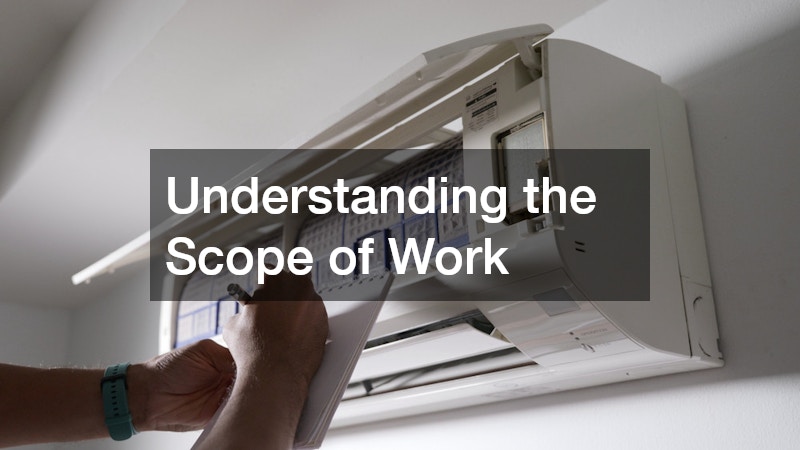Making Sense of Home Service Quotes
When it comes to hiring professionals for home improvements or repairs, comparing home service quotes is a critical step in making an informed decision. A quote is more than just a price—it’s a window into the company’s professionalism, reliability, and understanding of the work required. Yet, many homeowners find themselves unsure of how to interpret the numbers, terms, and details that come with each estimate. Without a proper comparison strategy, it’s easy to overlook hidden costs or miss the signs of a potential mismatch in quality.
Effectively evaluating home service quotes requires a thoughtful and organized approach. You need to look beyond the total price and examine what’s included, how services are structured, and whether the providers meet essential standards. Whether you’re remodeling a kitchen, installing a new HVAC system, or waterproofing your basement, the ability to confidently compare quotes helps you avoid unexpected surprises and choose the service that delivers the best value. With the right knowledge, you can turn a pile of estimates into a clear path toward completing your project with confidence.

Understanding the Scope of Work
The scope of work outlined in a quote tells you exactly what a contractor plans to do—and just as importantly, what they don’t. A clearly defined scope ensures both parties are on the same page regarding tasks, materials, and responsibilities. When comparing home service quotes, it’s important to pay attention to how detailed this section is. Vague descriptions like “general repairs” can lead to misunderstandings, while a well-written scope will list out specific actions, materials, and timeframes for completion.
For instance, if you’re requesting quotes for HVAC services, each proposal should clearly state whether it includes ductwork installation, thermostat setup, removal of old units, or permit acquisition. One contractor might include all of these in their bid, while another might not—affecting the price and the final outcome. By carefully examining the scope, you can better compare what you’re actually getting for the price, ensuring the home service quotes you receive are evaluated on equal terms.
Reviewing Licensing and Insurance
Verifying licensing and insurance is a non-negotiable step when comparing home service quotes. These credentials protect you legally and financially, ensuring that the contractor is authorized to perform the work and is covered in case of accidents or property damage. A quote from a fully licensed and insured provider often reflects a higher level of professionalism and accountability. Comparing this aspect can help you rule out unqualified options, even if they offer a lower upfront price.
This is especially important when hiring providers for high-risk jobs like local roofing. A properly licensed roofing contractor will include their license number on the quote and be willing to provide proof of liability and workers’ compensation insurance. If these details are missing or unclear, it may be a red flag. While the quote might appear cheaper, the lack of coverage could cost you far more in the event of a mishap. Always make sure the home service quotes you’re comparing meet basic regulatory standards before looking at cost or timeline.

Evaluating Labor and Material Costs
One of the most common mistakes homeowners make when comparing home service quotes is focusing only on the total price rather than understanding how that price breaks down. A detailed quote should clearly outline labor costs, material expenses, and any other charges. This transparency allows you to see where your money is going and helps you identify whether a higher quote reflects superior materials or simply inflated labor rates. It also makes it easier to spot quotes that appear cheap but may be cutting corners.
For example, when requesting estimates from a fence company, make sure the quote distinguishes between the cost of materials like wood, vinyl, or metal and the labor involved in installation. A contractor who uses low-cost materials may offer a lower price, but you might end up with a fence that doesn’t last. On the other hand, a company that charges more may be offering premium materials and more experienced labor. Understanding this breakdown allows you to assess home service quotes more accurately and avoid misleading pricing.
Comparing Timelines and Completion Dates
Time is an important factor in any home improvement project. When reviewing home service quotes, don’t overlook the proposed start and end dates. Some contractors may offer an appealing price but won’t be available for weeks—or even months. Others may promise fast turnaround times but deliver lower quality in their rush to finish. Comparing timelines helps you choose a provider who can complete the job within your preferred timeframe without sacrificing quality.
This is especially relevant for something like a waterproofing service, where delays can lead to water damage or mold. If one provider says they can start immediately and finish within days while another estimates a much longer schedule, you need to determine whether that time difference is due to staffing, complexity, or material availability. Timelines should be reasonable, and completion dates should be clearly stated in the home service quotes so you can plan accordingly and hold providers accountable.

Identifying Hidden Fees or Charges
A quote that seems lower than others may not be a better deal—it could just be incomplete. Hidden fees are a common issue in home service quotes and can include charges for travel, cleanup, permits, or equipment rentals. These extra costs often appear after the work has started, catching homeowners off guard and inflating the final bill. To avoid surprises, carefully review each quote and ask questions about any vague or missing items.
For instance, when hiring a paving contractor, make sure the quote includes everything from base preparation and sealing to disposal of old materials. If these aren’t itemized, you may end up paying more than expected once the work begins. Reputable providers will offer full transparency and explain any potential add-on charges up front. Being thorough in your review helps ensure that all home service quotes you receive reflect the true cost of completing the job to your expectations.
Checking Payment Schedule and Terms
Understanding how and when a contractor expects to be paid is just as important as knowing how much they’ll charge. A professional quote should include a clear payment schedule that outlines deposits, progress payments, and the final balance. This schedule helps protect both you and the contractor by setting expectations and reducing the chance of disputes. When comparing home service quotes, reviewing these terms can help you avoid providers who ask for full payment up front or leave too much to the end.
For example, if you’re considering demolition services, the quote should specify when payments are due in relation to each phase of the project—such as site preparation, debris removal, and final cleanup. A fair structure might include a small deposit, a mid-project payment, and a final amount upon satisfactory completion. If one quote requests most of the payment early while another breaks it into milestones, the latter may offer more security and accountability. Comparing payment terms in home service quotes gives you more control and peace of mind.

Researching Reputation and References
A contractor’s quote tells you what they claim they’ll do, but their reputation tells you how likely they are to follow through. While comparing home service quotes, take time to research each provider’s reviews, ratings, and references. Online platforms, local directories, and even social media can offer insights into customer experiences. Additionally, asking for references and speaking directly with past clients can give you a better sense of a contractor’s reliability and work quality.
This is especially important when evaluating providers of ductless heating services. Since these systems require specialized knowledge, working with a contractor who has a proven track record ensures you’re getting skilled labor and proper installation. A company with strong reviews, verified testimonials, and technical experience is more likely to deliver on their promises than one offering a low price but little background. Comparing reputations along with the numbers in home service quotes helps you identify the best combination of cost and quality.
Considering Warranty and Service Guarantees
A warranty is a contractor’s promise to stand behind their work—and it can be a major deciding factor when reviewing home service quotes. Service guarantees give you protection if something goes wrong after the job is completed, and they reflect the provider’s confidence in their materials and workmanship. A longer or more comprehensive warranty often adds value, even if the quote is slightly higher than others without similar coverage.
Take, for instance, plumbing contractors. Their quotes should specify warranty terms for both labor and parts, especially if new fixtures or piping are involved. If one contractor offers a one-year guarantee while another provides a five-year warranty on their work, that difference could influence your decision. Knowing you have post-project support helps you feel more secure, and it highlights the contractor’s commitment to quality. Always factor warranties and service guarantees into your review of home service quotes—they’re often the key to long-term satisfaction.
Asking About Subcontractor Use
Subcontractors are commonly used in the home service industry, but many homeowners aren’t aware of who will actually be performing the work. When evaluating home service quotes, it’s important to ask whether subcontractors will be involved and how their work will be managed. While subcontracting isn’t inherently a negative practice, it does introduce additional variables that can affect the project timeline, communication flow, and quality control. A contractor who uses subcontractors should be transparent about which portions of the job they will outsource and what qualifications those subcontractors bring to the table.
This becomes especially relevant when working with an interior door contractor, as door installation may involve additional services like painting, frame adjustments, or baseboard trimming. Some providers may complete these tasks themselves, while others rely on different teams or subcontracted tradespeople. A thorough home service quote should specify whether subcontractors will be used, and it should identify what parts of the work fall under their responsibility. You’ll want reassurance that the contractor will oversee all work being done and that quality won’t be compromised. Including this level of detail in your comparison helps ensure that you’re not only choosing based on cost but also on coordination and accountability.
Balancing Cost With Overall Value
While it may be tempting to choose the lowest quote, price should never be the sole deciding factor. A high-quality home service quote balances reasonable cost with clear value—offering dependable workmanship, quality materials, transparency, and good communication. Comparing quotes isn’t just about numbers; it’s about identifying who will deliver the best outcome for your budget and expectations. A well-priced quote that meets your needs without cutting corners is often the better investment in the long run.
This is especially true when working with a local home builder on a major renovation or new construction project. A slightly higher quote may reflect better craftsmanship, stronger warranties, or more thoughtful design. In contrast, a cut-rate bid might exclude crucial details that could lead to unexpected expenses later. The best approach is to weigh the total offering—not just the dollar amount—when reviewing home service quotes to ensure you get the value your project deserves.
Making Informed Home Decisions
Comparing home service quotes is a skill that goes far beyond choosing the lowest number. A thoughtful review process involves examining the scope of work, timelines, payment terms, insurance coverage, and other critical factors that influence the quality and reliability of the finished job. Quotes should be clear, detailed, and easy to compare side by side. By understanding what to look for—and what to question—you can avoid unexpected costs, delays, or unsatisfactory results.
Whether you’re hiring plumbing contractors, a paving contractor, or a local home builder, each quote offers clues about a provider’s experience, professionalism, and long-term value. Taking the time to analyze these documents thoroughly ensures you invest wisely in your home. With careful comparison, you’ll feel confident in selecting the right partner for your project—and the home service quotes that lead to lasting satisfaction.



